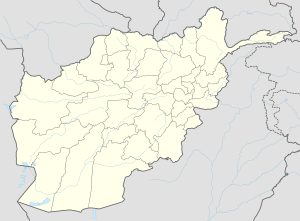Bazai Gonbad
Baza'i Gonbad
بزای گمبز | |
|---|---|
 Ruin of Karwan-balasi near Bozai Gumbaz photographed by Aurel Stein | |
| Coordinates: 37°8′0″N 74°0′0″E / 37.13333°N 74.00000°E | |
| Country | |
| Province | Badakhshan Province |
| Elevation | 12,600 ft (3,800 m) |
| Time zone | + 4.30 |
Baza'i Gonbad or Bozai Gumbaz (Persian: بزای گمبز, lit. 'domes of the elders'[2]) is the site of a domed tomb (or gonbad) and nearby settlement of Kyrgyz and Wakhi herders in the Wakhan in Badakhshan Province in north-eastern Afghanistan. It lies in the Little Pamir on the right bank of the Bozai Darya, near where it joins the Wakhjir River to become the Ab-i Wakhan,[1][3]
This eastern reach of the Wakhan Corridor has little access to the outside world. Most of the supplies comes through traders from the neighboring Chipursan and Misgar valleys of Gilgit-Baltistan in Pakistan.
There is no evidence to indicate that the local Pamir Mountains had ever earlier supported permanent settlements. While debris of mud buildings and similar constructions can occasionally be found, they are generally seen as only indicating relatively recent occupation and have little if any evidence of a permanent character. The shrines and tombs scattered throughout the area are all of a comparatively recent character. There are also the remains of a small fort can be found near this location. It is said to have been built by Bozai, a Kyrgyz chief.[1]
Baza'i Gonbad was the scene of a minor incident during the Great Game. In 1891 the Russians sent a small military force to the area. The British Captain Francis Younghusband, in the course of his Pamir expedition, encountered the Russians at Baza'i Gonbad, and the Russians ordered him out of the area. The Russians subsequently apologised for the incident.[4]
See also
References
- ^ a b c Adamec, Ludwig W., ed. (1972). Historical and Political Gazetteer of Afghanistan. Vol. 1. Graz, Austria: Akadamische Druck-u. Verlangsanstalt. p. 47.
{{cite book}}: Cite has empty unknown parameters:|month=,|chapterurl=, and|coauthors=(help) - ^ Mock and O'Neill (2004): Expedition Report
- ^ "NGA GeoName Database". National Geospatial Intelligence Agency. Archived from the original on 22 July 2010. Retrieved 2010-07-20.
{{cite web}}: Unknown parameter|deadurl=ignored (|url-status=suggested) (help) - ^ Riddick, John (2006). The history of British India. Praeger Pub Text. p. 82. ISBN 978-0-313-32280-8.


